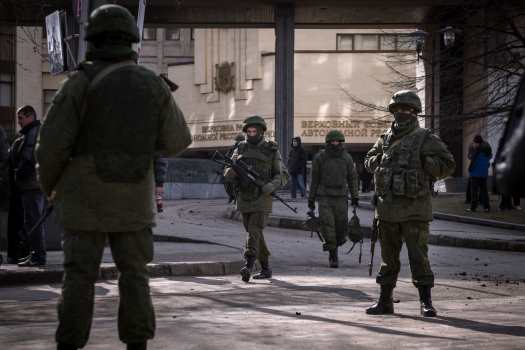
Fleeing Crimea for Crown Heights
A little over a week ago, Leah Lipszyc left Simferopol, the Crimean city where she and her husband have been the Chabad emissaries for the past 22 years.
There are about 13,000 Jews in Simferopol, 30 of whom come to the synagogue run by Lipszyc and her husband every Shabbat. Lipszyc, who has 12 grown children, struggled with the decision to leave—it was the Lubavitcher rebbe personally who sent her, in 1992—but advisers in Brooklyn counseled her to leave, for her own safety. “This is my community,” she told me when we met in the basement apartment/warehouse in Crown Heights where she is now staying. “On the other hand, you have your kids writing to you saying, ‘Mommy, it’s dangerous, Mommy, when are you leaving?’”
But the buses weren’t running, the roads were blocked, and the airplanes were grounded. There was only one train running, and it was going to Donetsk. “Therefore,” Lipszyc said, “I got on the train to Donetsk.” She got the last two tickets on the train. “I really only had about 10 to 15 minutes to pack. I left almost everything. I took my computer, my iPad, my camera, my cards from my other camera, and a little bit of clothes. And I forgot my good sheitel.” She laughed. “I forgot a lot of things.”
Lipszyc is a short woman with sharp eyes and a ready smile. When we met she wore a honey-tinted chin-length sheitel, a silver cardigan, and a long, leopard-print grey skirt. She said that all winter, as protests seized Kiev, she wasn’t afraid. “We figured, Kiev is the other end of Ukraine, it’s like saying something’s going on in Maine and you’re in Florida,” she explained. “We really never thought they would be coming for Crimea.” But after the fall of Viktor Yanukovych in late February, she started to feel less secure. “When we first realized that an upheaval was coming to Crimea, I remember feeling similar to people in World War II in Belgium, how one day they woke up and soldiers were there. And I thought, one day I could wake up and there could be foreign soldiers in our city. And then it happened.”
When Russian soldiers invaded the Crimea and her city two weeks ago, they blocked off the ports and put up roadblocks across the routes leading from the peninsula to the rest of Ukraine. The banks closed, then reopened for limited withdrawals of about $110 a day. “In the beginning there was a row of soldiers and they weren’t letting anyone into the center of the town,” Lipszyc recalled. “We took down the sign on the shul, locked it up, moved the services somewhere else.” Her driver retrieved the Sifrei Torah and prayer books from the synagogue, behind police lines—a rescue Lipszyc credits to divine intercession. “I wrote to the Rebbe via the Igros Kodesh and I said, Rebbe, we really need to get the Sifrei Torah out, please, please, help us get them out,” she explained.
Now Lipszyc is trying to carry on her responsibilities from Brooklyn, offering advice via Skype on preparing mishloach manot baskets for Purim and other sundry duties. “Rabbis are really trying not to get involved politically, they are just doing counseling for people on both sides,” she said. “Whatever people need to hear to be calm, like that, pareve.”
Lipszyc says she is hoping for a Purim miracle, but in the meantime, she is busy trying to solicit donations—to pay for guards.











Farshtey Nisht
What is the danger? The whole world is looking. It is like a fish-tank. Putin hasn’t done harm to Yiden in his own backyard. Lepeleh shekaftza aleihem pachad, be-eys sheyesh makom lekarev nefoshos be-idud ube-gashmiyus.
Kop Mentch
Bravery “oif yenem’s cheshbon” (self sacrificing others). Maybe you go there until things settle!